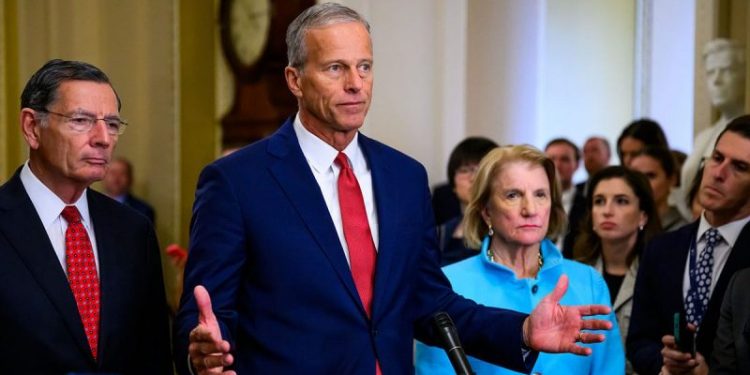Senators believe that after reaching a deal to end the longest shutdown on record, they won’t be in the same position early next year.
The bipartisan package that advanced from the Senate late Monday night would, if passed by the House this week, reopen the government until Jan. 30. Lawmakers believe that extension would give them enough time to fund the government the old-fashioned way, making another shutdown a moot point.
But that all depends on whether they can complete work on spending bills, find agreement with the House, and get them on President Donald Trump’s desk before the new deadline.
There’s also the possibility that if the guarantee for a vote on expiring Obamacare subsidies does not go how Senate Democrats want, that could significantly hamper Congress’ ability to avert yet another shutdown.
‘We’ll take them one day at a time,’ Senate Majority Leader John Thune, R-S.D., said. ‘Obviously, it’s another deadline we have to deal with. But the immediate objective is to get the government open and enable those conversations to commence.’
‘There are Democrats and Republicans who are both interested in trying to do something in the healthcare space,’ he continued. ‘And clearly, there is a need. I mean, there is an affordability issue on healthcare that has to be addressed, and the current trajectory we’re on isn’t a sustainable path.’
Sen. Richard Blumenthal, D-Conn., told Fox News Digital that Democrats needed to be united in their demand that ‘Republicans be held to their promise of having a vote on the healthcare subsidies in December.’
Thune reiterated his guarantee on Sunday and teed up the second week of December as the deadline for getting a Democratic proposal to the floor.
‘The future is unpredictable, but we need to continue our fight unequivocally, unyieldingly, for affordable healthcare insurance through extending the subsidies and other measures under the [Affordable Care Act],’ Blumenthal said. ‘Republicans have a reflexive obsession with repealing or destroying the ACA.’
The hope is that funding the government with appropriations bills will be the key to preventing another shutdown.
Senate Appropriations Chair Susan Collins, R-Maine, said that she anticipated Thune to tee up a new package of spending bills, this one combining the defense, labor, transportation and housing bills into one chunk.
‘The more appropriations bills that we’re able to pass, the better off we’re going to be, the better off the American people will be served,’ she said.
Sen. Mike Rounds, R-S.D., a member of the Senate Appropriations Committee, was unsure if lawmakers would be in the same spot again come January.
But he believed that the desire to move forward with spending bills, spurred largely by the bipartisan deal struck to reopen the government, was a good start.
‘It makes it a whole lot easier not to have a shutdown again,’ he said.
Despite the rancor and frustration from the Democratic side of the aisle over the collapse of their healthcare demand, they also want to pass bipartisan funding bills, largely in a bid to push back against cuts made by the Trump administration.
However, Sen. Chris Murphy, D-Conn., predicted that it would be quite difficult to pass a long-term bipartisan budget.
‘We cannot sign on to a long-term budget that does nothing on healthcare and has nothing to stop the destruction of our democracy,’ he said. ‘You know, there are no real protections in the short-term spending bill against Trump’s illegality.’
For now, some see the January deadline as ‘light years away,’ like Sen. John Kennedy, R-La., while others aren’t ready to make a prediction about what comes next.
‘Just one step at a time,’ Sen. Chris Van Hollen, D-Md., told Fox News Digital.














